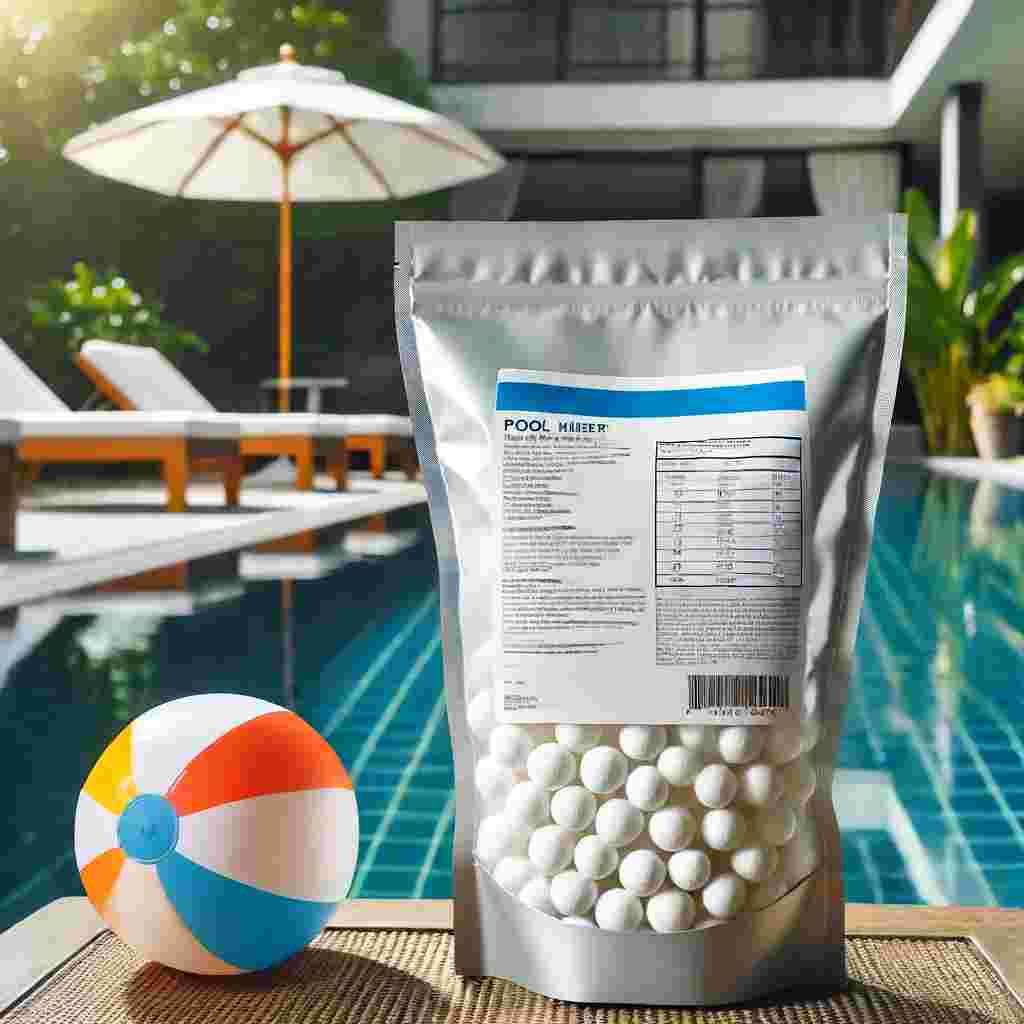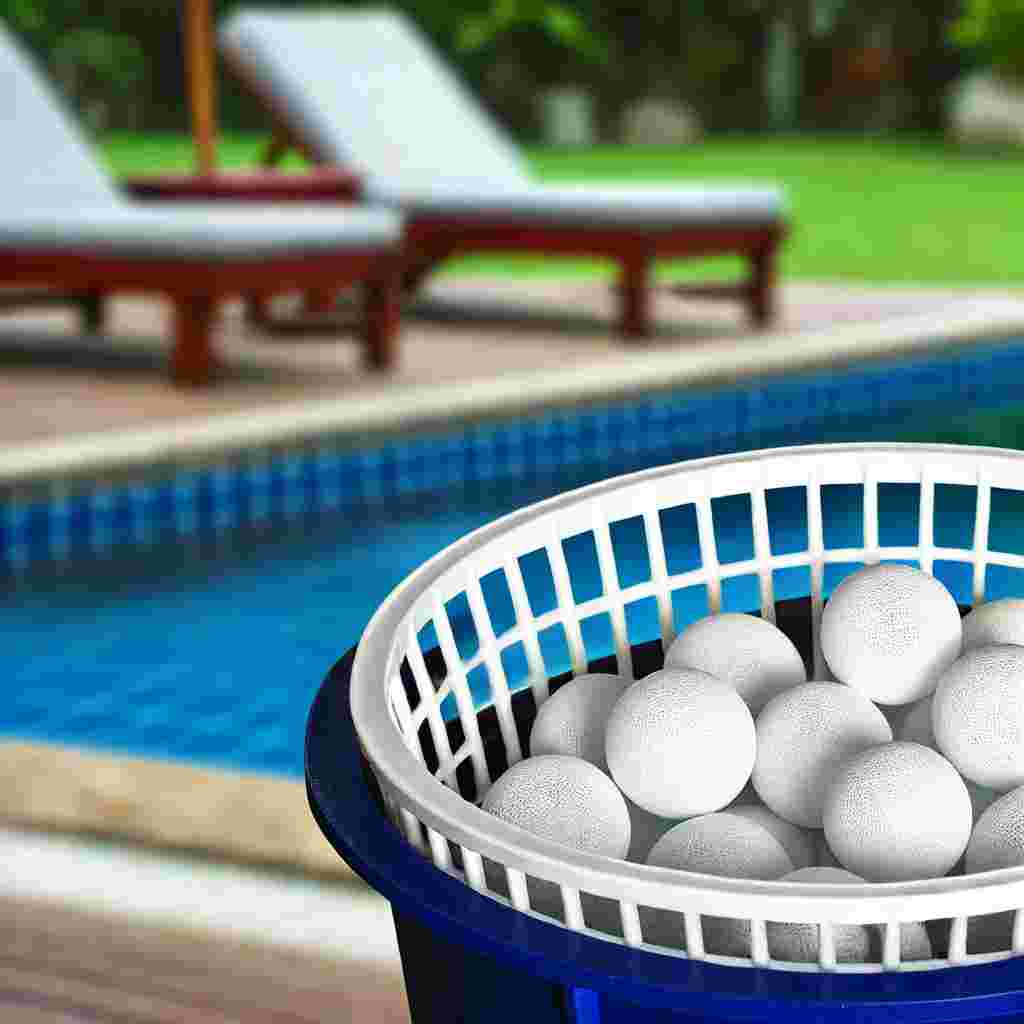A rain-soaked pool can be a headache, filled with mud, leaves, debris, and rainwater pollutants that turn the water murky. Are you struggling to find a quick and effective way to clean your pool after the rain? Don’t worry! Today, we’re going to talk about a simple and efficient cleaning method: pool filter balls. In this article, you’ll learn how to use poly balls for sand filters to clean your rain-drenched pool and keep the water sparkling clear. Let’s dive in and tackle the post-rain pool cleaning challenge together!
What Are Pool Filter Balls?
Pool filter balls are a new type of filtration medium that offer better filtration performance and longer lifespan compared to traditional sand filter systems. Filter balls are lightweight and easy to use, capable of capturing even the finest particles, including micron-sized contaminants, ensuring your pool water remains crystal clear.
Materials of Pool Filter Balls
Pool filter balls are typically made from polyester fibers, known for their high density and excellent adsorption properties. This material effectively captures various impurities, outperforming traditional sand filter media. Polyester fibers are also durable and resistant to chemical corrosion, ensuring that the filter balls maintain their effectiveness even when exposed to pool chemicals over long periods.
Shape and Design of Pool Filter Balls
The design of pool filter balls has been carefully optimized, usually featuring a spherical or oval shape. This design not only increases the surface area of the filter balls, enhancing their filtration efficiency, but also allows water to flow more evenly through the balls, preventing the “channeling effect” common in traditional sand filters. The spherical design also ensures that the filter balls pack tightly together in the filter, improving the overall efficiency of the filtration system.
Causes of Pool Pollution After Rain
Rainwater not only brings airborne pollutants into the pool but also carries mud, leaves, and other debris. These contaminants affect water quality and can clog the filtration system, making pool maintenance more challenging. Understanding the sources of these pollutants can help us clean the pool more effectively.

Airborne Pollutants
Rainwater can carry dust, pollen, and other airborne pollutants into the pool, causing the water to become murky. These tiny particles require an efficient filtration system to be removed, ensuring clear water. In areas with severe air pollution, this issue is particularly pronounced. To effectively deal with airborne pollutants, the pool filtration system must have sufficient capacity to capture and remove these fine particles.
Ground Debris
Rainwater washes ground debris, such as mud, leaves, and other trash, into the pool. These larger particles settle at the bottom of the pool and, if not promptly cleaned, can affect the pool’s appearance and water quality. Ground debris not only includes mud and leaves but also organic materials like grass clippings and insect carcasses. If not promptly cleaned, these debris can foster bacteria and algae growth, further deteriorating water quality. Therefore, timely removal of ground debris is essential to maintain a clean pool.
Chemical Pollutants in Rainwater
Rainwater itself may contain chemical pollutants like sulfuric acid and nitric acid found in acid rain. These chemicals alter the pool water’s chemical balance, potentially causing changes in pH levels that affect overall water quality. Acid rain, common in areas with heavy industrial pollution, can quickly react with pool water, lowering the pH and increasing water corrosiveness, damaging pool equipment. Therefore, addressing chemical pollutants in rainwater is also a crucial step in post-rain pool cleaning.
Why Choose Pool Filter Balls?
Compared to traditional sand filter systems, pool filter balls offer numerous advantages. First, pool filter balls are lightweight and easy to handle, requiring less frequent replacement. Secondly, they provide superior filtration, capturing finer particles. Lastly, using pool filter balls can save water resources as they do not require frequent backwashing.
Superior Filtration Performance
Pool filter balls can capture finer impurities, including micron-sized particles, ensuring crystal-clear pool water. Traditional sand filter systems typically handle larger particles but struggle with fine particles. Filter balls, with their high density and adsorption properties, effectively trap these fine particles, significantly enhancing water clarity. Studies show that filter balls can capture particles as small as a few microns, far exceeding the performance of traditional sand filters.
Long Lifespan
Filter balls generally have a longer lifespan than traditional sand filter media, reducing replacement frequency and costs. While sand filter systems typically require sand replacement every 2-3 years, filter balls can last up to 5 years or more. This reduces maintenance frequency and costs while minimizing the impact on pool usage during filter media replacement. Additionally, filter balls are more durable and maintain excellent filtration performance over long periods, unaffected by wear or chemical corrosion.
Easy Maintenance
Pool filter balls are easy to clean and maintain, without the need for frequent backwashing, saving significant water resources and time. Traditional sand filter systems require regular backwashing to remove accumulated debris, which consumes a lot of water. Filter balls, on the other hand, do not need frequent backwashing; they can be cleaned by simply removing and rinsing them with water. This not only conserves water but also simplifies the maintenance process, making pool upkeep more convenient and eco-friendly.
Steps to Clean Your Pool After Rain Using Pool Filter Balls
Cleaning a pool after rain may seem complex, but it can be easily managed with a few simple steps. Below, we detail how to use poly balls for sand filters to clean your rain-drenched pool.
Preparation
Before starting the cleaning process, some preparation is necessary. First, check the pool’s water level to ensure it is within the normal range. If the water level is too high, you can drain some water. Next, gather your pool cleaning tools, such as a pool vacuum and a skimmer net. Ensure these tools are in good condition and ready to use.
Remove Large Debris
Use a skimmer net to remove large debris from the pool surface and bottom, such as leaves and branches. This step reduces the load on the filtration system, allowing the filter balls to focus on capturing fine particles. When removing large debris, you can work section by section, starting with the surface and then the bottom, ensuring thorough cleaning. For mud and silt settled at the bottom, use a pool vacuum to suction the debris, preventing it from resuspending in the water.
Install Pool Filter Balls
Place filter balls into the pool filtration system. Ensure the filter balls are evenly distributed to avoid clogging. Follow the filter balls’ usage instructions for optimal filtration results. During installation, disassemble the filtration system to remove any remaining debris, then add the filter balls. After installation, reassemble the filtration system, ensuring all parts are securely in place and properly sealed.
Start the Filtration System
Start the pool’s filtration system, allowing pool filter balls to begin working. After running the filtration system for a while, you will notice the water gradually becoming clearer. During this time, regularly check the filter balls’ condition to ensure they are functioning properly. Adjust the water flow rate as necessary to ensure optimal filtration. Typically, a medium flow rate is ideal for filter balls; too high or too low flow rates can impact filtration efficiency.
Regularly Clean the Filter Balls
Although maintaining filter balls is relatively simple, they still need regular cleaning. Depending on usage, remove the filter balls every few weeks or months, rinse them with clean water to remove attached debris, and then return them to the filtration system. To clean the filter balls, place them in a large container and rinse them repeatedly with clean water until the water runs clear. Gently rub the filter balls during rinsing to help remove attached dirt.
Maintaining Pool Water Quality
Besides using poly balls for sand filters to clean your pool after rain, regular pool maintenance and care are also crucial. Here are some tips to keep your pool water clean:
Regular Water Quality Testing
Regularly test your pool water to ensure pH levels, chlorine levels, and other indicators are within normal ranges. This helps prevent water quality issues and reduces the load on the filtration system. Use professional water testing kits or pool water test strips to regularly monitor water quality. If any parameters are abnormal, take immediate action, such as adjusting pH levels with chemical agents or increasing chlorine dosage.
Keep the Pool Surroundings Clean
Maintain a clean environment around the pool to reduce the amount of debris entering the pool. Consider planting low-shedding plants around the pool to minimize debris. Regularly sweep the pool’s surrounding area to remove leaves and trash, ensuring a tidy environment.
Use a Pool Cover
When not using the pool, cover it with a pool cover to prevent dust, leaves, and other debris from entering. A pool cover also reduces water evaporation, conserving water. Various types of pool covers are available, such as dust covers and insulating covers. Choose the appropriate cover based on your needs. Using a pool cover not only reduces debris entry but also provides insulation and energy-saving benefits, especially in cold seasons, by minimizing heat loss from the pool.
Regularly Clean the Filtration System
Regularly inspect and clean the filtration system to ensure it operates properly. The filtration system is crucial for maintaining pool water quality, and regular maintenance can extend its lifespan. Inspect the filtration system monthly or quarterly, removing accumulated debris inside to ensure the filter balls and other components function correctly.
Control Pool Usage
Control the number of people using the pool to avoid rapid water quality deterioration caused by too many swimmers. In public pools, high usage can significantly increase contaminants. Establish reasonable usage limits based on the pool’s capacity to ensure a clean and safe swimming environment for all users.
Proper Use of Pool Chemicals
Properly use pool chemicals to ensure stable and clean water quality. Chemical usage should be adjusted based on actual conditions; excessive or insufficient use can affect water quality. Seek professional guidance to properly adjust chemical dosages based on water quality tests, ensuring safe and stable water quality.
Important Tips for Using Pool Filter Balls
To ensure the optimal performance of filter balls, consider the following tips:
Avoid Direct Contact with Chemicals
While pool filter balls are durable, prolonged exposure to strong acids and bases can affect their performance. Avoid direct contact with filter balls when adding chemicals. Temporarily shut off the filtration system when adding chemicals, allowing them to dissolve fully before restarting the system.
Regular Replacement
Despite their long lifespan, filter balls’ efficiency may decline over time. Replace filter balls annually or biennially based on usage and water quality to maintain optimal filtration. When replacing filter balls, inspect other filtration system components to ensure overall system functionality.
Proper Use of the Filtration System
Avoid continuous operation of the filtration system; regular shutdowns help extend the lifespan of filter balls and equipment. Develop a reasonable filtration system operation schedule based on pool usage, ensuring efficient operation when needed and allowing the system to rest at other times.
Conclusion: Discover the Benefits of TBPFilter High-Efficiency Pool Filter Balls
Cleaning your pool after rain doesn’t have to be a daunting task. With pool filter balls, you can easily tackle post-rain debris and maintain clear, clean water. We highly recommend TBPFilter high-efficiency pool filter balls for their superior performance, long lifespan, and easy maintenance. These filter balls will make your pool maintenance routine more efficient and eco-friendly. Give TBPFilter a try and experience the difference in your pool’s water quality! Enjoy a crystal-clear pool and dive into a refreshing swimming experience today.

